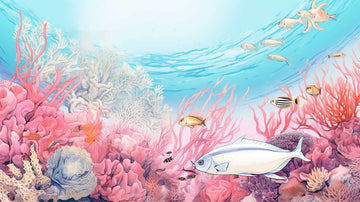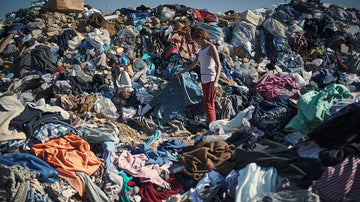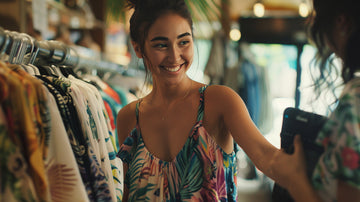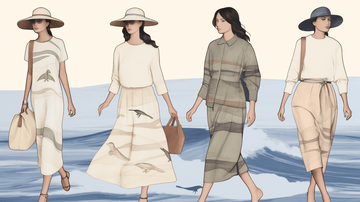
While eco-friendly swimsuits and sustainable clothing have been trending for years, only recently has clean beauty and skin care products started to focus on sustainability and giving back to the planet. One trend has been for sunscreen lines to start producing “reef safe” sunscreens — but what does that exactly mean?
What is reef safe sunscreen?
Reef safe sunscreens do not contain harmful ingredients like “oxybenzone or octinoxate” which affect reef coral’s health. These are two of the more harmful ingredients found in most sunscreens. Fact: Hawaii and Key West, Florida have banned sunscreens from being sold with both these ingredients, in 2018 (Hawaii) and 2019 (Key West, Florida). Reference: Here.
When choosing a sunscreen, choose mineral sunscreens, like All Good products, that are labeled “non-nano.” Non-nano means that the particles in sunscreen are larger than 100 nanometers. What does this mean for coral reef protection? Coral cannot ingest particles larger than 100 nanometers, leaving them unaffected and safe.
You should also look for water and sweat resistant sunscreen products. What does this mean? This means looking for a sunscreen that will stay on your body for longer than your time spent in the ocean -so long-lasting sunscreens that rub into your skin. Tip: Be sure to re-apply frequently for sun protection.
- Reef safe sunscreens do not contain harmful ingredients like “oxybenzone or octinoxate” which effect reef coral’s health.
- Choose mineral sunscreens that are labeled “non-nano.” Non-nano means that the particles in sunscreen are larger than 100 nanometers.
- Look for water and sweat resistant sunscreen products that will stay on your body for longer than your time spent in the ocean -so long lasting sunscreens that rub into your skin.
What sunscreen is safe for coral reefs?
Our choice is All Good products. Here are just a few reasons why we love All Good products. All Good products are made in the USA. They are a Women Owned company. All Good products are certified B Corporation, cruelty free, and climate neutral. They are also part of 1% for the Planet, just like us. To learn more visit their website.
Why care about saving coral reefs?
There are loads of toxic chemicals in conventional sunscreen that harm coral reefs in many different ways, including:
- Harmful chemicals in conventional sunscreen enter the ocean when vacationers, swimmers, surfers, etc. use a toxic sunscreen on their body and get in the ocean. Even if you don’t go directly in the ocean, sunscreen lotion will eventually be washed off your body in the shower and end up back to the ocean. These chemicals are very tenacious.
- If you thought you were very different from coral reefs, think again. After you lather yourself head to toe, your skin begins to absorb chemicals from sunscreen. These chemicals can be measured in the body through blood, breast milk, and urine samples. Even the FDA has found that some of these toxic ingredients enter the bloodstream at levels far beyond what the recommended FDA-established threshold. Yet another reason mineral sunscreens are the better choice for you and for the coral reefs. Reference: Here.
- Coral reefs protect coastlines from storms and erosion, provide jobs for local communities, and offer opportunities for recreation. They are also a source of food and new medicines. Reference: Here.
Where can I buy reef safe sunscreen?
Lots of places! But of course, from the Sands Swim website. Our product selection is hand picked and includes All Good product’s top sellers. If you are looking for more, go to the All Good products website. Sands Swim supports like-minded brands and those working for the greater good.
As we stated, no one is perfect, but we do our best to be better for you and the planet we live in.
Commonly asked sunscreen questions
- What does SPF stand for? Sun Protection Factor
- What does UVA UVB mean? Long-wave ultraviolet A rays (UVA) and short-wave ultraviolet B rays (UVB) penetrate the ozone layer and induce a variety of nasty reactions like sunburns and premature skin aging, and they also put us at a higher risk for diseases like skin cancer.
-
What is the difference between mineral sunscreen and chemical sunscreen?
Mineral sunscreens provide protection against the full spectrum of ultraviolet radiation. Mineral sunscreen acts as a physical blocker. It literally blocks out the light acting as a reflector and creating a protective barrier. Most mineral sunscreens contain zinc oxide which also can help reduce acne prone skin by reducing inflammation of the skin.
Chemical sunscreens contain filters that protect against UVB radiation, the type of wavelength that damages the superficial layers of the skin and causes sunburns. Chemical sunscreens are referred to as an “absorber” , the opposite of a “reflector” mineral sunscreen. Through a chemical reaction, these chemical compounds convert UV rays into heat, then release that heat from the skin. This can be problematic for those that suffer from Melasma due to the heat on the skin.
- Why are some sunscreens tinted and are they better? Cosmetic reasons, but can also provide sun protection like a non-tinted sunblock and also counteract that white color you can get using sunscreens containing zinc oxide and titanium dioxide without tint. Most people can’t even tell you have a tinted sunscreen on while using it.
- What does water resistant sunscreen mean? How long the sunscreen remains effective while you are swimming or sweating. That means that after 40 or 80 minutes of swimming or sweating, you should reapply sunscreen. Sunscreens that have a water rating of 80 might state they are "Very water-resistant."
- How often should I re- apply sunscreen? Generally, sunscreen should be reapplied every two hours, especially after swimming or sweating. More if you are active and in direct sunlight.
Here are a list of some sunscreen that are also recommended as coral safe sunscreens;
Suntegrity Mineral Body Sunscreen



